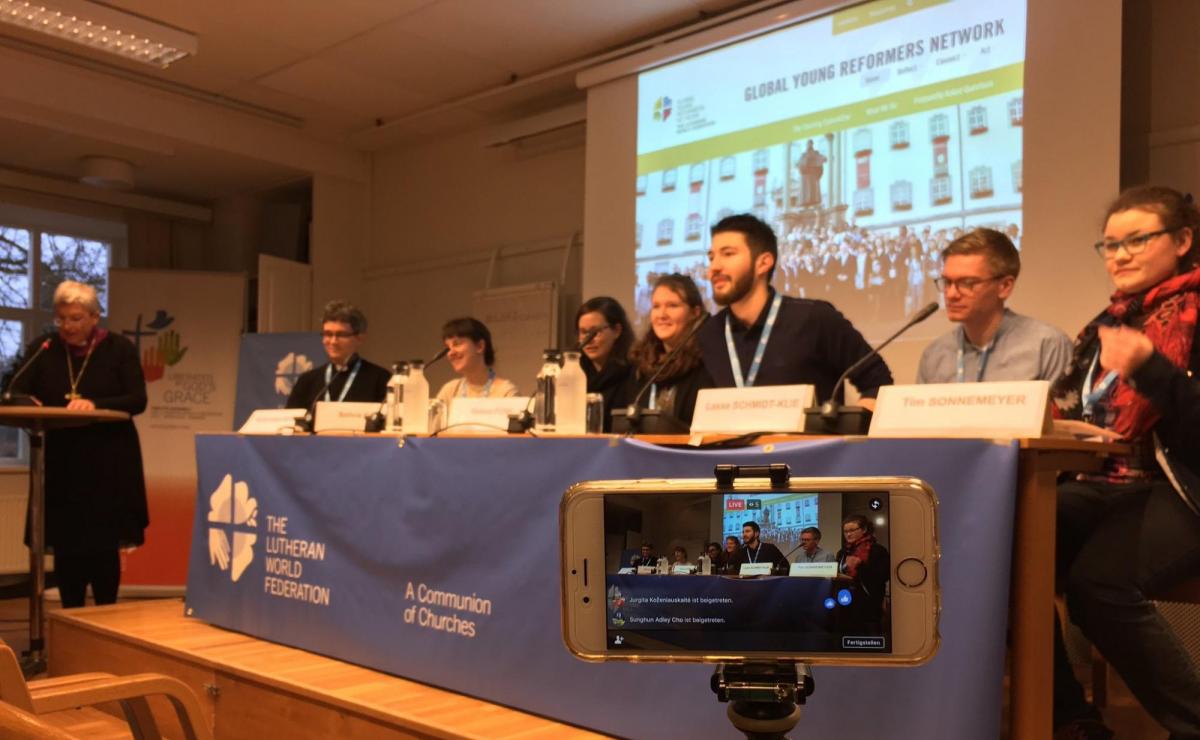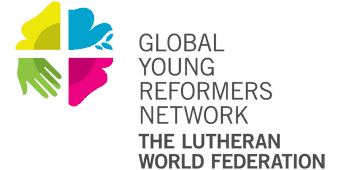Youth Message to the LWF Europe Pre-Assembly

Presented by the youth delegates from the three European regions on 04-02-2017 in Höör, Sweden
We are thankful to be part of the European Pre-Assembly. Being here means a lot to us; meeting people from so many different churches widens our view, it helps us to reflect on ourselves and supports our developing sense of what it means to be Lutheran today. We grow into the communion of churches and it fills us with joy to see how this communion is growing as well.
We are glad that our perspective counts. We don’t speak as guests, but as participants. In the speech of Martin Junge, but also during the discussions, we got the feeling that we’re not just here to fulfill a quota or to look nice on pictures taken by the Head of Communications, but to be a substantial part of this event. You are curious about our positions and views and we are truly grateful for that.
Young people are known for being spontaneous. Some of us were invited at the very last minute… and as you can see: we are here. Not because we are struggling to fill our schedule, but because we want to be part of something meaningful, something that is worth fighting for.
But being invited last minute raises the question: Why haven’t we been part of the process from the very beginning? Since 1984 the youth quota has been in place. In 1984, we weren’t even all born yet. For over 30 years this topic has been on the agenda but sadly we still can’t take it for granted, as we experienced during the last weeks - and as we have experienced yesterday.
Every seven years a new Council is elected - every seven years. And yesterday we heard that two out of three regions in Europe haven’t nominated enough young people. We wonder: Are there no ambitious young Lutherans in Sweden or Norway? Are there no young reformers from Russia or Romania? Or why are churches still struggling to nominate young delegates?
Themes of intergenerational concern
When asking ourselves which topics are of concern for young Lutherans all over Europe, we came up with quite a number of ideas – and then happily noticed that over the last few days, they have already become topics during the Pre-Assembly: Lutheran identity, human rights, climate justice, and populism.
“Lutheran Identity” was part of the discussion about “Self-understanding of Lutheran Communion” as well as within the small discussion groups.Furthermore, “human rights” was one of the topics that concerned us , and after having been mentioned by Martin Junge in his first speech, it continued to be a common theme.
On Wednesday “climate justice” and sustainability was once again brought to our attention during the session on “creation not for sale”. We were really happy to recognize that this topic continues to be discussed and requires our attention. By looking back we see that a lot of work and effort has been put into this topic, but we also know that there is still a lot of work to be done in order to protect creation, our earth. We highlight the importance of ongoing environmental protection. At the end of the Pre-Assembly we discussed how our talk and behaviour met our goals, and we talked about our ecological footprint and the need for changing our consumption patterns. We really appreciate the hospitality of the Swedish Church and the delicious meals we had. However, we - as youth - were thinking about making future conferences more sustainable and would suggest to re-think the consumption pattern - especially the consumption of meat during future Assemblies - to make our talk and our behaviour fit together and to make the LWF a role-model for sustainability practices.
One of the themes which caught our attention was “populism” - one of the 4 P’s (polarization, populism, protectionism and post-truth) mentioned in the sermon of Archbishop Jackelen.
During the whole meeting we happily noticed all the work which has been done on different themes - in discussion but also in studies and booklets. Nevertheless, we want to stress that this whole Pre-Assembly is a very important meeting for exchange, but we also see it as a first step and want to remind ourselves that it should not stay on this level, but needs action and implementation back home. So we see the biggest task is still ahead of us.
Finally, we are very glad that the topics which were important for us were also brought up and seemed to be the ideas and thoughts of all of us.
However we want to add a little something and highlight two points that are important from a youth perspective:
As young Christians we are worried about climate change, poverty and populism. They are real challenges we are being called to tackle.
Declining membership in European churches
At the same time, we also see spiritual challenges with which our churches are faced.
In European countries, many Lutheran churches are slowly dwindling. For many different reasons, members of the churches are leaving, children are not being baptized and church pews remain empty. Are we taking this issue seriously?
We constantly need to return back to the roots. We are called to love Jesus and follow him as his disciples and we are called to courageously proclaim the Good News -- The empty grave, Jesus’ victory over death through the cross and resurrection and his coming again in glory. This we are sent to bear witness to, in joy and in suffering. Through Christ we are transformed and only in Him can we be good stewards of Creation.
As youth, we believe that this should always be our core, our message and our calling.
Need for interreligious and intercultural dialogues
We notice that times are changing. Societies are getting more multicultural and multireligious and on the other hand, extremist parties gain members and populism is rising. Prejudices grow and xenophobia is a rising phenomenon.
Due to this current situation we think that interreligious and intercultural dialogue in Europe is more important than ever. We have to strengthen dialogue with Jewish congregations to remember once again our Christian roots. Furthermore, we need to seek dialogue with other religions like Islam, which is nowadays more widely represented in our society. Within Europe, which is becoming more secular, coming together with people of different religions, cultural backgrounds and ethnic groups can signal a desire to work together. While we appreciate these dialogues, which are done by the LWF on the leadership level, we propose to strengthen this theme and to open up space for coming together within the member churches and parishes in order to face current situations and upcoming xenophobia as well as populism.
The various experiences of our member churches are an enrichment of our Lutheran Communion. They are characterized by coexistence of different religions in peace: some with Christianity as a majority religion and others with Christians as a minority within their society.
Let us face other religions not with fear but with interest.
Let us start learning from each other on a grassroots-level, as this can strengthen us in the Communion and it is a way to raise our voice against xenophobia and populism so that we can live together peacefully.
We offer our talents and a lively network
We as the LWF – and by that we mean everyone in this room, but also each and every member - are on the way to Namibia. A lot is already being prepared. On this context just a quick reminder: The Young Reformers have a very active Facebook group, WhatsApp group and are connected in various ways. In other words, there is a lively network bringing young people from all over the world together, every day. The high number of participants shows how interested we are in sharing the gospel and being Lutheran today. There is a longing to share about our own contexts and learn from each other.
This community is full of ideas and talents.
To highlight that fact, we want to add two examples of a Young Reformers project:
The postcard project "Note for sale": Together with two delegates from Germany and Australia we printed some beautiful postcards. We designed them to depict the three sub-themes: Salvation, Human Beings and Creation- not for sale. You can think about those topics and write something creative about them on the back. After you write a card, you can register on our website NoteForSale.org and you will receive the address of a person who has also registered online. This is who you can send your postcard to. In return someone will write and send you a card. So get one - send one and receive one. We brought some cards with us and you can always ask for more. We think this is a good way to make our global communion visible at home.
Secondly, we want to highlight a very innovative project by young reformers from the Evangelical Lutheran Church of Finland. See the video they produced to reach young people in Finland.
Apart from the growing community online and those involved in the postcard movement, there will be a special Youth Pre-Assembly in Namibia. This is a great opportunity for us to be well prepared for what is to come. We highly recommend: Make sure to endorse youth delegates for this Pre-Assembly.
As you have seen: We can contribute topics and practical ideas. When discussing strategies about how the General Assembly is reflected in your home churches, make good use of young people’s gifts and know that we are eager to learn about what happens in Namibia.
Let’s do this together.
